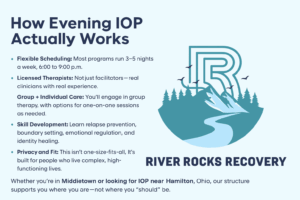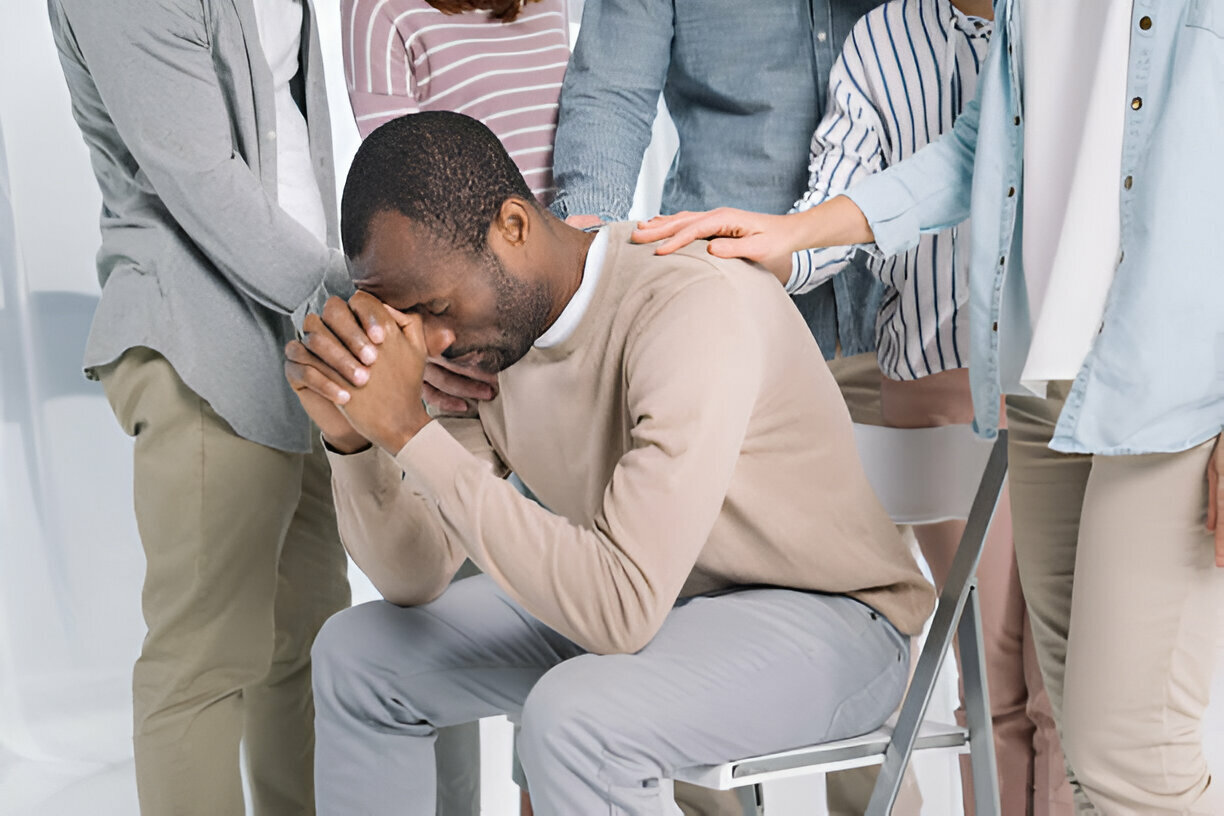Even if no one else sees it, you know you’re running on fumes.
From the outside, you’re holding everything together—your job, your responsibilities, your relationships. You show up. You deliver. Maybe you even get praised for how composed you seem. But under the surface, things feel brittle. You’re white-knuckling your way through the day, and numbing your way through the night.
It’s not a collapse. But it’s not peace either.
You may not think of yourself as someone who “needs treatment.” But deep down, you know something’s off. You want change. You just don’t want to blow up your life to get it.
Evening IOP at River Rocks Recovery in Middletown, Ohio exists for exactly this moment. For exactly you.
Here’s what one real week in IOP might actually look like—without drama, without pressure, and without pretending everything’s fine when it isn’t.
Monday: You Log In, Still Unsure
The workday ends. You close your laptop with that familiar tension in your shoulders. You think about skipping. Think about that drink. You think about how much easier it is to not look at this.
But you log into IOP anyway.
You’re not ready to spill everything. That’s fine. You leave your camera off. You just listen.
No one makes you introduce yourself with some dramatic origin story. The group is calm. Focused. Real. And the facilitator says something that sticks:
“You don’t have to know what’s wrong yet. You just have to be willing to look.”
So you do.
Tuesday: You Start Noticing You’re Not Alone
Group check-ins happen at the start. Everyone gives a short update—how they’re doing, what’s coming up.
You say something simple like, “I had a hard time sleeping last night.”
Someone else jumps in: “Me too. I kept replaying a conversation I had and couldn’t turn my brain off.”
The connection is small, but it’s real. You’re used to being the one who “keeps it together.” But here, you can loosen your grip. You don’t have to perform wellness. You just have to show up.
“I thought I’d be the only one with a job, a family, and still drinking. But everyone here has a version of that story.”
— IOP Client, 2023
Wednesday: You Get Language for the Things You’ve Been Carrying
Tonight’s topic is emotional avoidance.
The facilitator explains how people with high-functioning patterns often develop coping strategies that look productive—like overworking, caretaking, or numbing with alcohol in private.
You feel something click. This isn’t about weakness. It’s about overcompensation.
You realize that your ability to keep pushing isn’t the whole story. You’ve just been using all your energy to hold yourself up—and none of it to heal.
You leave session with a note scribbled on a Post-it:
“I’m not broken. I’m exhausted.”
Thursday: You Slip Up… But Don’t Slide Out
The week catches up with you. A work deadline pushes your stress through the roof. Your evening feels like static. And by the time you even think about group, you’ve already poured a drink.
In the past, that would’ve been the end of it. Shame would’ve taken over. You would’ve ghosted. Told yourself, “I can’t even go one week. This isn’t for me.”
But this time, you log in anyway.
You say it. The truth. And instead of silence, you hear this:
“That’s the point of group. You can mess up and still come back. We want you here, not your perfection.”
You stay the full session.
You’re not “failing treatment.” You’re doing it.

Friday: You Feel… Lighter
The week hasn’t been easy. But something is different.
You’re starting to identify when your autopilot kicks in. You’re naming the feelings you used to drink through. You’re realizing you don’t have to swing from all-or-nothing anymore.
This isn’t about sobriety as a performance. It’s about honesty as a relief.
You log out on Friday night and sit with yourself for a moment. Quiet. No racing thoughts. Just a soft sense of: I’m allowed to want more than survival.
Saturday–Sunday: Rest Feels Possible
There are no sessions on the weekend, and at first that worries you. But now that the week is behind you, you’re starting to notice the shifts.
You go grocery shopping and feel less frantic. You skip the usual Sunday night binge and realize you’re okay without it. You sleep—not perfectly, but deeper.
You’re not fixed. But you’re also not flailing.
And it’s only been one week.
How Evening IOP Actually Works
Evening IOP isn’t therapy-lite or group chat. It’s structured clinical support led by trained professionals, delivered in a format that respects your reality.
Here’s what you can expect:
- Flexible Scheduling: Most programs run 3–5 nights a week, 6:00 to 9:00 p.m.
- Licensed Therapists: Not just facilitators—real clinicians with real experience.
- Group + Individual Care: You’ll engage in group therapy, with options for one-on-one sessions as needed.
- Skill Development: Learn relapse prevention, boundary setting, emotional regulation, and identity healing.
- Privacy and Fit: This isn’t one-size-fits-all. It’s built for people who live complex, high-functioning lives.
Whether you’re in Middletown or looking for IOP near Hamilton, Ohio, our structure supports you where you are—not where you “should” be.
FAQ: What If I’m Still Drinking or Using Occasionally?
You can still come.
Evening IOP is not reserved for people who are already sober. In fact, many people begin while still navigating substance use. What matters is your willingness—not your record.
Honesty is encouraged, not punished.
If your use puts your safety at risk, we’ll work with you to figure out the right level of care—whether that’s IOP, detox, or another support step.
FAQ: What If I Don’t Think I’m “Bad Enough” for Treatment?
That thought is the trap.
High-functioning individuals often delay help because they’re “not like other people.” But the truth is, the exhaustion, isolation, and quiet unraveling you feel is just as valid.
You don’t have to wait for a DUI, a job loss, or a rock bottom.
If you’re wondering whether this level of care is right for you, that’s often a sign that it is.
What Happens After IOP?
Many clients continue with weekly outpatient therapy or step down into less frequent sessions. Some return to individual work with a therapist they trust. Some join alumni groups or peer communities.
The point isn’t to stay in treatment forever.
It’s to use IOP as a stabilizing foundation—so you can make long-term changes with structure, not shame.
You Deserve This Kind of Support
You don’t have to self-destruct to qualify for care.
You don’t have to hit bottom. Or ruin your career. Or get caught.
You just have to be tired of doing it all alone.
At River Rocks Recovery’s IOP program in Middletown, Ohio, we specialize in holding space for people who are ready to quietly, bravely, and consistently choose better.
If you’re reading this, it might be time.
Ready to take the first step?
Call (888) 905-6281 or visit to learn more about our IOP services in Middletown, Ohio. We’re here when you’re ready.




























